|
|
|
Sort Order |
|
|
|
Items / Page
|
|
|
|
|
|
|
| Srl | Item |
| 1 |
ID:
132531


|
|
|
|
|
| Publication |
2014.
|
| Summary/Abstract |
Afghanistan has been the global epicenter of heroin production for the past decade. Heroin networks and drug lords present a principal impediment to security, state building, and democratic governance. Beyond the national boundaries, Afghan-originated heroin creates enormous challenges for international security by financing terrorism, instigating corruption, killing nearly 100,000 users worldwide every year, undermining public order, and debilitating economic development. The devastating impacts of the Afghan heroin trade have spilled over into Southwest Asia, Central Asia, Russia, China, the Balkans, and Europe. Because Turkey stands on the shortest transit pathway between Southwest Asia and Europe, it is intensively exposed to illicit flows of Afghan heroin along the Balkan Route. Transnational crime syndicates have been exploiting Turkish territories for decades for the purpose of trafficking heroin to European markets. This paper discusses Afghan heroin as an international security conundrum. It further seeks to explore the dimensions of the threat in Turkey, new patterns in heroin trafficking, and profiles and operation modes of transnational syndicates. The analyses are based upon the scrutiny of important case files, national seizure database, and annual KOM provincial questionnaires. In conclusion, the paper puts forward policy recommendations for security elites both in Turkey and in other states affected by the illicit trade of Afghan heroin.
|
|
|
|
|
|
|
|
|
|
|
|
|
|
|
|
| 2 |
ID:
132526
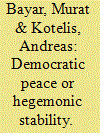

|
|
|
|
|
| Publication |
2014.
|
| Summary/Abstract |
Democratic peace theory (DPT) and hegemonic stability theory provide different explanations for cooperation among (democratic) states. The Imia/Kardak crisis took place between Greece and Turkey, two democratic, nonnuclear, and interdependent states in the post-Cold War era, thus, offers rare insights into these theorized processes. During this crisis, democratic actors and issues contributed to escalation, whereas war was prevented in the last minute by the coercive diplomacy of the USA. Based on our archival research in Greece and Turkey, our findings pose a challenge to the validity of the DPT for democratic dyads with territorial conflicts.
|
|
|
|
|
|
|
|
|
|
|
|
|
|
|
|
| 3 |
ID:
132529
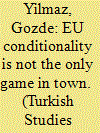

|
|
|
|
|
| Publication |
2014.
|
| Summary/Abstract |
Despite the weakened push by the European Union (EU) conditionality across time, Turkey's Europeanization process continues in a number of areas selectively. Focusing on such a puzzling trend, this article critically examines the role of EU conditionality on Turkey's Europeanization and unpacks domestic drivers of change. The article explores the impact of grassroots actors ?Turkish civil society organizations, business interest groups, media and political parties? on domestic change in the last decade and argues that continuing reforms in many areas in an era of limited EU-push are influenced by domestic actors.
|
|
|
|
|
|
|
|
|
|
|
|
|
|
|
|
| 4 |
ID:
132525
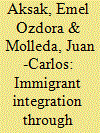

|
|
|
|
|
| Publication |
2014.
|
| Summary/Abstract |
This research focuses on the European Union's (EU) public relations and public diplomacy efforts for immigrant integration. It uncovers the relationship between the EU and leaders of Turkish associations in Brussels, Belgium. In-depth interviews with Turkish association leaders reveal the way they see themselves and the Turkish diaspora, how they reflect on their national identities, and their understanding of EU public diplomacy and public relations strategies. The communication strategies Turkish associations use to gather information about immigrant integration and their opinions on EU communication strategies are also studied. In addition, the research investigates whether two-way communication exists between the Turkish associations and the EU, and unveils the strategic communication and public relations strategies the Turkish diaspora uses to influence public policy and to engage in lobbying.
|
|
|
|
|
|
|
|
|
|
|
|
|
|
|
|
| 5 |
ID:
132528


|
|
|
|
|
| Publication |
2014.
|
| Summary/Abstract |
Turkey is a negotiating candidate for the EU membership. Though the accession negotiations between Turkey and the EU continue in the official sense, in reality, the relations are in a deadlock. It is often argued that Turkey-EU relations have entered a new era since January 2013, and new optimistic comments have emerged. This paper argues that there exists a pull-push balance in the accession process for the EU that normally attracts candidates and makes them more vulnerable to the EU conditions. The success of the political transformation of eastern European states relied to a large extent on the balanced pull-push accession processes. It is argued here that this balance for Turkey has been deteriorated and this fact has made the EU ineffective in transforming Turkish politics and polity. Therefore, this paper argues for the re-establishment of the balance to improve and normalize Turkey-EU relations.
|
|
|
|
|
|
|
|
|
|
|
|
|
|
|
|
| 6 |
ID:
132524
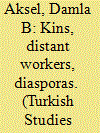

|
|
|
|
|
| Publication |
2014.
|
| Summary/Abstract |
This paper analyzes the politics of the Turkish state about "Turks abroad" as a process of defining the status of and constructing the perceptions about its transnational members. Falling back on transnationalism and diaspora studies, it aims to bring together the policies of the Turkish state regarding emigrants and co-ethnics who have been stranded during the collapse of the empire from which the modern state emerged. From the point of view of the sending state/external homeland, it compares the different trajectories and policies which have been put in place during different periods, and traces the parallel actions which have been taken over the last two decades regarding both constellations. The paper also investigates the way in which the extra-territorial membership is constructed and defined-by putting emphasis on its fluidity over time as a result of endogenous and exogenous factors.
|
|
|
|
|
|
|
|
|
|
|
|
|
|
|
|
| 7 |
ID:
132522
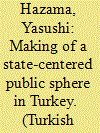

|
|
|
|
|
| Publication |
2014.
|
| Summary/Abstract |
Why has the state-centered recognition of the public sphere prevailed in Turkey over the last decade? A frame analysis of the public sphere discourse for 2002-09 reveals that the contingency of the discourse on the Islamic headscarf issue discouraged an essential understanding of the authentic public sphere. The dominant frame espoused by secularists claimed that the state banned headscarves in the public sphere were to preserve the neutrality of the public sphere. By contrast, pro-Islamists initially adopted an alternative counter-frame based on the Habermasian perspective, portraying the public sphere as tolerant of various ideas. Yet, in the face of stiff opposition from secularists, the pro-Islamists came to use a negative counter-frame with increasing frequency, implying that the state-centered public sphere impinged on the freedom to wear a headscarf. As a result, both the secularists' and pro-Islamists' frames helped entrench the recognition of the state-centered public sphere in Turkish society (Earlier and longer versions of this paper have appeared as IDE Discussion Paper Series No.262 (November 2010) and in Japanese in Ajiakeizai, Vol 52, No. 4 (April 2011)).
|
|
|
|
|
|
|
|
|
|
|
|
|
|
|
|
| 8 |
ID:
132523
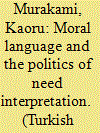

|
|
|
|
|
| Publication |
2014.
|
| Summary/Abstract |
Liberal modernists have claimed that democracy requires participation by interested parties in the politics of need interpretation. Poor people, an interested party, may lack the rational and critical language essential for the process of interpretation. This paper discusses a different perspective on the language of participation by the poor. Focusing on the everyday practices of the poor and using information collected from ethnographic research in Sultanbeyli, a low-income district in Istanbul, Turkey, it is shown how discursive power constrains the language and the manner of talking that the poor use to articulate their needs. The people in the district, "former villagers bound to the Anatolian tradition" using religious morality as a justification of their demands, successfully negotiate with administrators of social assistance programs, thus participating directly in the politics of need interpretation.
|
|
|
|
|
|
|
|
|
|
|
|
|
|
|
|
| 9 |
ID:
132527


|
|
|
|
|
| Publication |
2014.
|
| Summary/Abstract |
This article aims to discuss and analyze the emergence and evolution of Turkey's role as a model in the international system in three different periods, 1991-93, 2003-05 and 2010-12. To this end, it methodologically uses the main concepts of role theory: role expectations, role conceptions and role performance. Focusing on K.J. Holsti's example national role conception category in particular, it seeks to reveal the major similarities and differences between the role expectations that have enacted the role conception known as the Turkish model, and compare the impact of these expectations on role performance in each of these three cases. The major argument of the article is that the sustainability of the model's national role conception depends foremost on Turkey's political and economic capabilities that directly influence its role performance.
|
|
|
|
|
|
|
|
|
|
|
|
|
|
|
|
| 10 |
ID:
132530


|
|
|
|
|
| Publication |
2014.
|
| Summary/Abstract |
The Turkish economy has gradually liberalized and has become integrated into the regional and global economies since the 1980s. This article analyzes how the Turkish public evaluates the integration of the Turkish economy into the global economy, in particular, increasing trade ties, globalization, greater availability of foreign products and travel opportunities, the impact of multinational companies and international financial institutions. The evidence from Pew Global Attitudes Surveys shows that the Turkish public is overwhelmingly positive about certain changes such as increasing trade and availability of foreign products, whereas they are overwhelmingly negative about others such as the impact of multinationals and of immigration. Regression analyses demonstrate that these attitudes are shaped by individuals' perceptions of whether they have benefited from the liberalization of the economy.
|
|
|
|
|
|
|
|
|
|
|
|
|
|
|
|
|
|
|
|
|